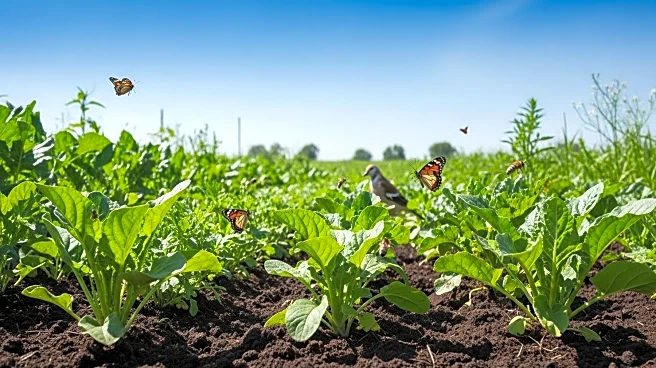What's Happening?
Regenerative agriculture, a farming practice focused on soil health, carbon sequestration, biodiversity, and water capture, is facing challenges due to the lack of a clear, regulated definition. The term 'regenerative' is often used without a consistent standard, leading to confusion and potential greenwashing. The Regenerative Organic Alliance, formed by the Rodale Institute, offers a certification considered the gold standard, but other certifying bodies have emerged with varying criteria. California is the first U.S. state to define regenerative agriculture formally, but this definition only applies to government funding eligibility. Whole Foods Market, a leading natural grocer, accepts multiple regenerative certifications, emphasizing the need for organic practices. The USDA has not yet regulated a definition for regenerative agriculture, leaving grocery stores to assess claims independently.
Why It's Important?
The lack of a standardized definition for regenerative agriculture has significant implications for consumer trust and industry practices. Without clear guidelines, companies may engage in greenwashing, misleading consumers about the environmental benefits of their products. This confusion can erode trust in certifications and impact the credibility of the regenerative agriculture movement. As consumers increasingly seek products that support environmental health, the demand for clear and reliable certifications grows. The absence of federal regulation means that grocery stores and certifying bodies play a crucial role in maintaining integrity in the marketplace. The debate over whether organic practices should be a baseline for regenerative agriculture highlights the complexity of balancing environmental goals with practical farming methods.
What's Next?
The Regenerative Organic Alliance plans to introduce a 'Journey to ROC' program to help farmers transition to regenerative practices without initially requiring USDA Organic certification. This initiative aims to encourage more farmers to adopt regenerative methods while maintaining high standards. The Federal Trade Commission is reportedly preparing to update its Green Guide, which could impact how environmental claims are regulated. As the regenerative agriculture movement gains traction, stakeholders must navigate the challenges of defining and certifying practices to ensure consumer trust and industry growth. The ongoing debate over certification standards and the role of organic practices will continue to shape the future of regenerative agriculture.
Beyond the Headlines
The ethical and environmental implications of regenerative agriculture extend beyond soil health. The movement emphasizes the interconnectedness of human health, animal welfare, and ecosystem resilience. As the industry evolves, the challenge lies in creating a unified approach that supports sustainable practices while accommodating diverse farming needs. The potential for greenwashing underscores the importance of transparency and accountability in certification processes. Long-term shifts in consumer behavior and industry standards will depend on effective education and regulation to ensure that regenerative agriculture fulfills its promise of environmental and social benefits.









